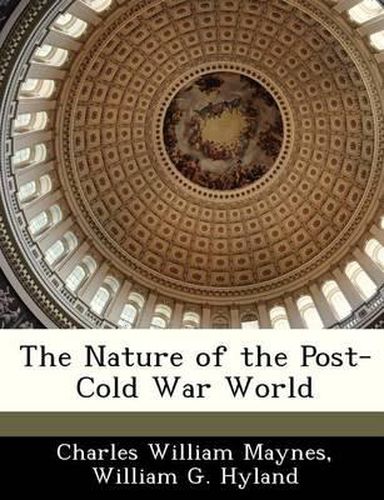Readings Newsletter
Become a Readings Member to make your shopping experience even easier.
Sign in or sign up for free!
You’re not far away from qualifying for FREE standard shipping within Australia
You’ve qualified for FREE standard shipping within Australia
The cart is loading…






The editors of the nation’s two leading journals on foreign policy were asked to examine the nature of the post-cold war world and America’s transitional role. These essays represent the views of Charles William Maynes, editor of Foreign Policy, and William G. Hyland, former editor of Foreign Affairs. Charles Maynes reviews the major transitions that marked 45 years of Soviet-American strategic confrontation. Predictably, the U.S. global role and defense resources are declining as old threats decrease and domestic problems move higher up on the policy agenda. Less predictably, the relative defense spending of small powers is likely to increase, adding to the potential for regional instability. These trends and the proliferation of weapons technology, including weapons of mass destruction, will drive the major powers toward their third attempt in this century to deal with global instability through collective security. Power will become more evenly distributed as America’s military dominance recedes and others’ economic power increases. Such trends, Mr. Maynes believes, should not be disturbing so long as prudent retrenchment does not become a foolish retreat from an American global role. William Hyland believes that no president since Calvin Coolidge has inherited an easier foreign policy agenda. Presidents from Truman through Bush did the cold war “heavy lifting,” and the Clinton transitional era should mark the ascendancy of domestic over foreign policy issues. Economic power is essential to America’s future and the country faces the difficult task of economic recovery while avoiding the political expedience of protectionism or other forms of belligerence toward our trading partners. This would accelerate international fragmentation, undermining the political trends toward a collective security regime that is vital to the new world order and is the best alternative to the extremes of U.S. isolationism or global policeman.
$9.00 standard shipping within Australia
FREE standard shipping within Australia for orders over $100.00
Express & International shipping calculated at checkout
The editors of the nation’s two leading journals on foreign policy were asked to examine the nature of the post-cold war world and America’s transitional role. These essays represent the views of Charles William Maynes, editor of Foreign Policy, and William G. Hyland, former editor of Foreign Affairs. Charles Maynes reviews the major transitions that marked 45 years of Soviet-American strategic confrontation. Predictably, the U.S. global role and defense resources are declining as old threats decrease and domestic problems move higher up on the policy agenda. Less predictably, the relative defense spending of small powers is likely to increase, adding to the potential for regional instability. These trends and the proliferation of weapons technology, including weapons of mass destruction, will drive the major powers toward their third attempt in this century to deal with global instability through collective security. Power will become more evenly distributed as America’s military dominance recedes and others’ economic power increases. Such trends, Mr. Maynes believes, should not be disturbing so long as prudent retrenchment does not become a foolish retreat from an American global role. William Hyland believes that no president since Calvin Coolidge has inherited an easier foreign policy agenda. Presidents from Truman through Bush did the cold war “heavy lifting,” and the Clinton transitional era should mark the ascendancy of domestic over foreign policy issues. Economic power is essential to America’s future and the country faces the difficult task of economic recovery while avoiding the political expedience of protectionism or other forms of belligerence toward our trading partners. This would accelerate international fragmentation, undermining the political trends toward a collective security regime that is vital to the new world order and is the best alternative to the extremes of U.S. isolationism or global policeman.